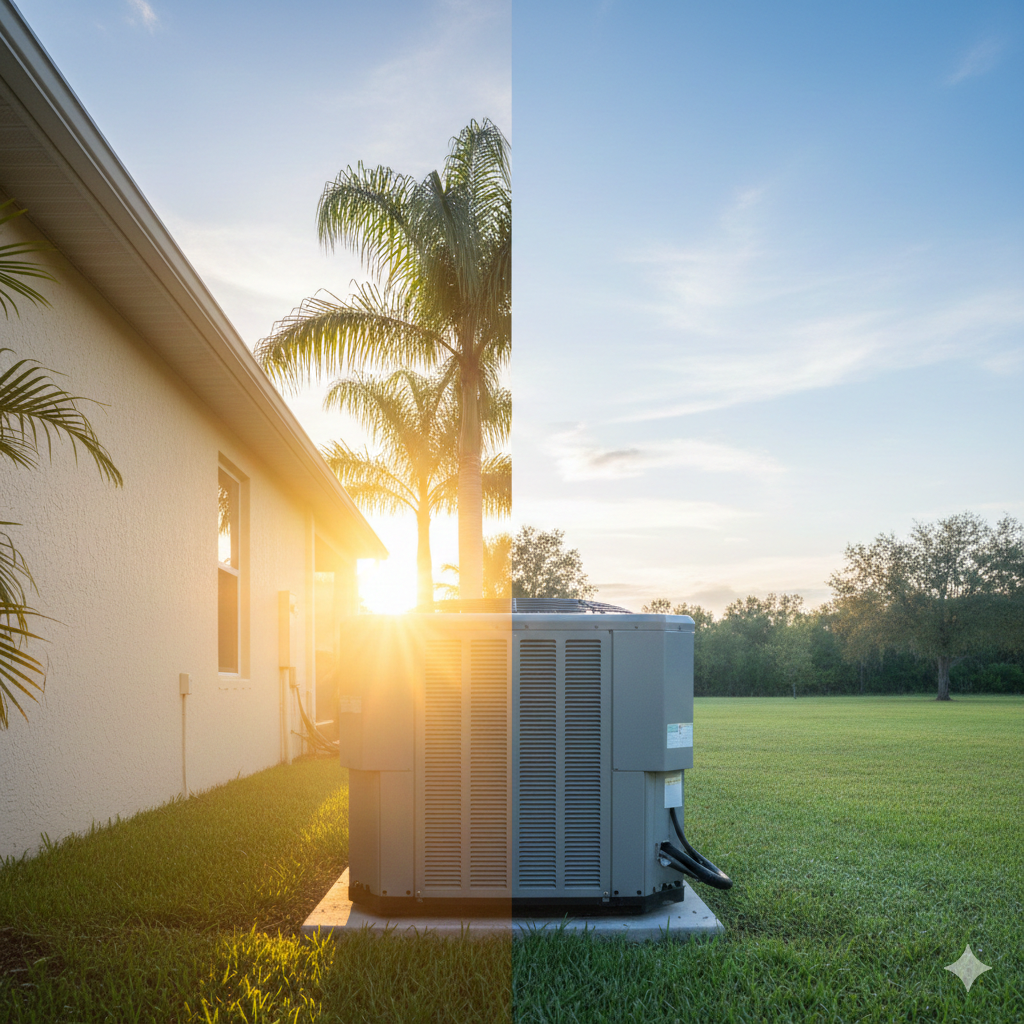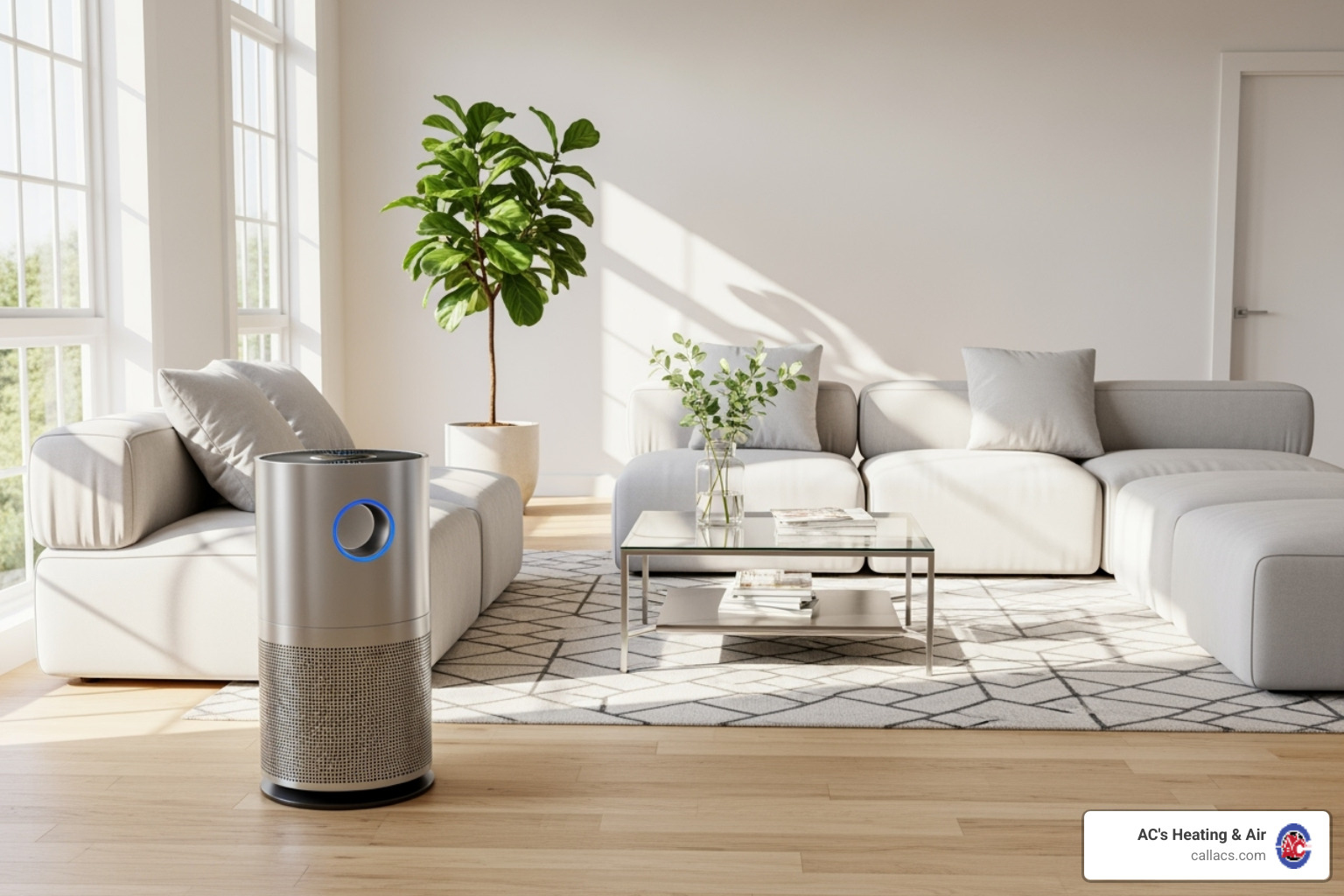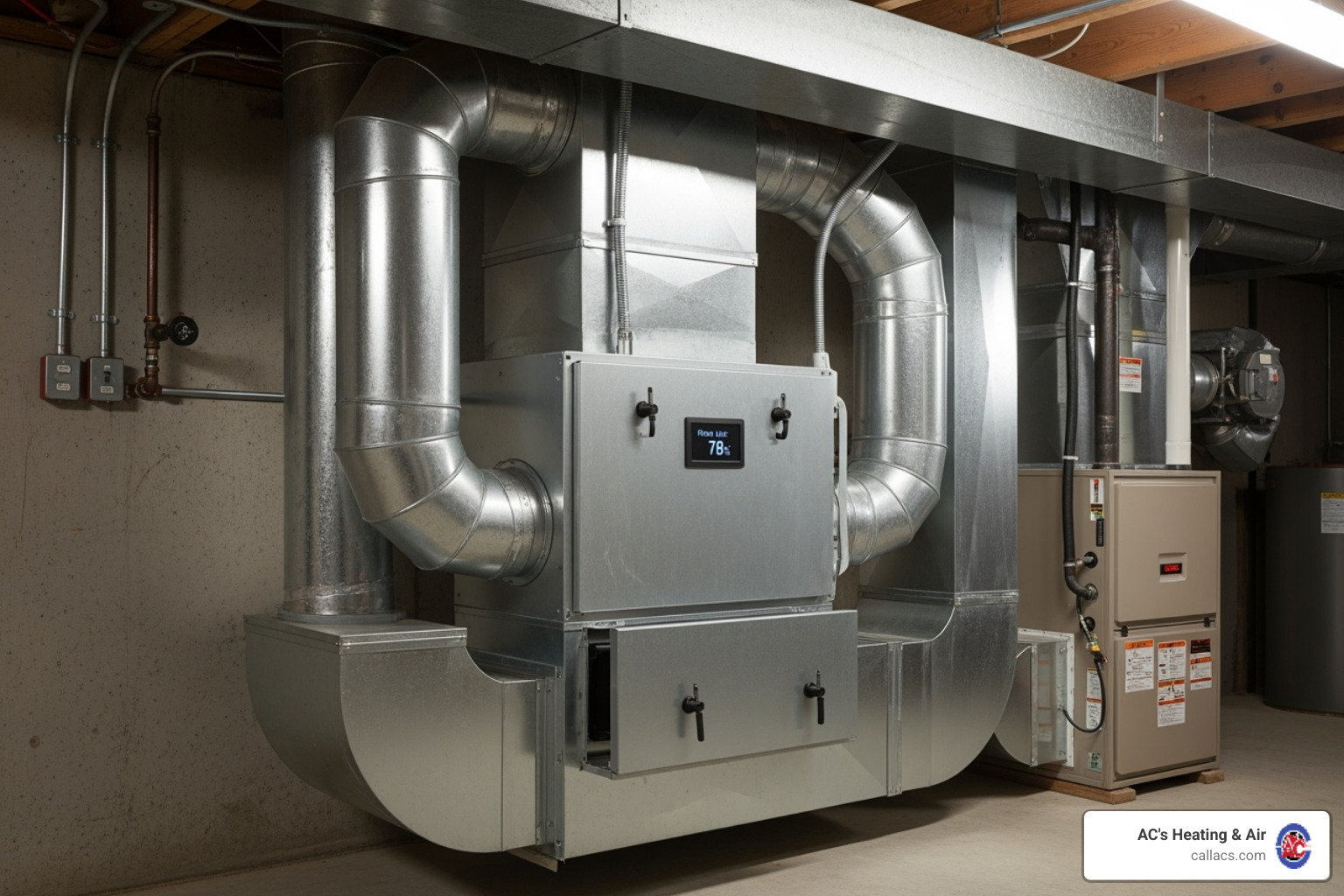Don't Get Filtered: Your Guide to HVAC Filter Lifespan
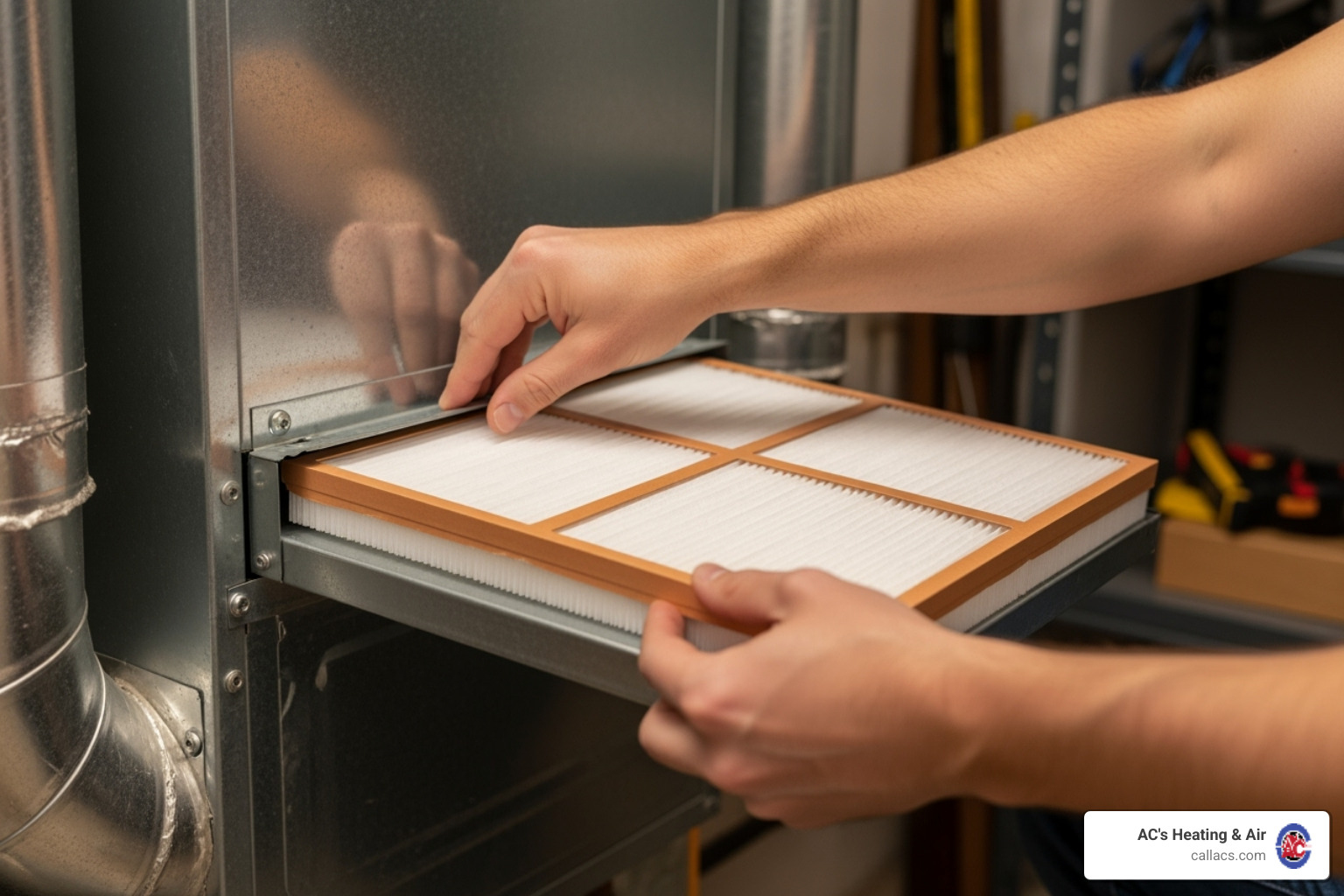
Why Knowing How Often to Replace HVAC Filter is Critical for Your Home
How often to replace HVAC filter depends on several key factors, but here's the quick answer most Central Florida homeowners need:
Standard Filter Replacement Schedule:
- 1-2 inch filters: Every 1-3 months
- 3-4 inch filters: Every 6-9 months
- 5-6 inch filters: Every 9-12 months
Adjust frequency based on:
- Pets: Change every 2 months
- Allergies/Asthma: Change every 6 weeks
- Multiple occupants: Change every 2 months
- Vacation homes: Change every 9-12 months
Your HVAC filter is a small but critical component for system efficiency and clean indoor air. A dirty filter forces your system to work harder, increasing energy bills by 5-15% and risking expensive equipment damage.
In Florida's year-round cooling climate, your HVAC system works overtime, so filters get dirty faster. Many homeowners don't realize a clogged filter can cause evaporator coils to freeze, leading to costly repairs.
The good news is that filter replacement is an easy, cost-effective way to maintain your HVAC system. Understanding the right schedule for your home—whether you have pets, deal with Florida's humidity, or just want to lower energy bills—can save you hundreds in repairs and utility costs.
I'm Allen Chenault, owner of AC's Heating & Air. In my 20+ years in the HVAC industry, I've seen countless system failures preventable by a simple filter change. Let me walk you through what you need to know to keep your system running smoothly and your family breathing clean air.
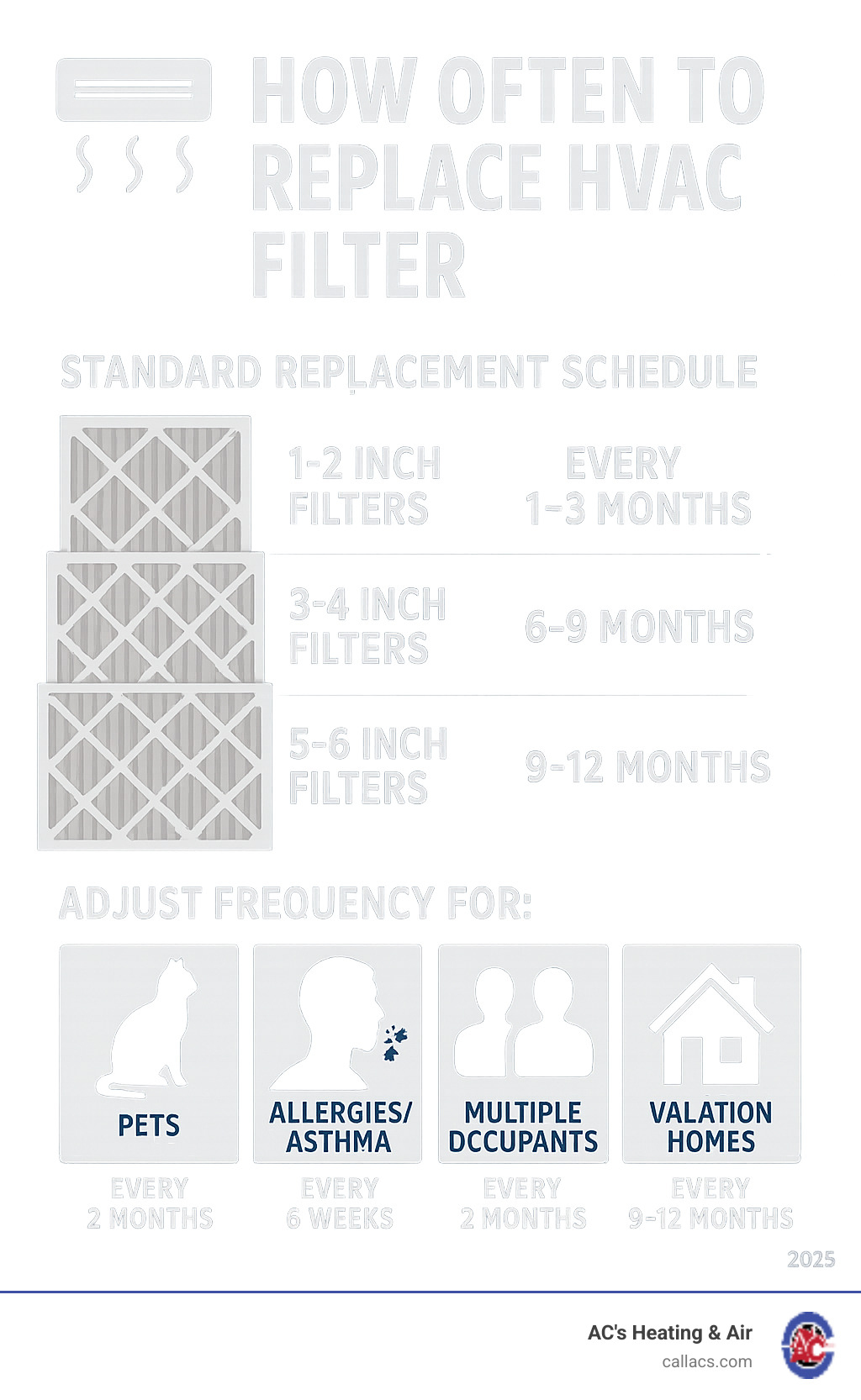
Basic how often to replace HVAC filter terms:
The General Rule: Recommended HVAC Filter Replacement Timelines
The answer to how often to replace HVAC filter starts with your filter type. A thicker filter with more surface area naturally lasts longer. While manufacturer recommendations are a starting point, Florida's real-world conditions matter more. The Department of Energy notes that replacing a clogged filter can boost efficiency by 5-15%—money back in your pocket.
Here's what works best for Central Florida homes, broken down by filter size:
1-2 Inch Filters
These are the standard filters found in most homes. Fiberglass filters are the budget option but are the least effective at catching particles. If using fiberglass filters, plan on 1-month replacements, as they fill up fast in Florida's climate.
Pleated filters in this range offer real improvement. Their accordion-style folds provide more surface area to trap dust, pollen, and dander. They typically last 1-3 months, but check them monthly during peak summer.
3-4 Inch Filters
Media filters are the sweet spot for many. These thicker filters have more pleated surface area, capturing more particles before restricting airflow. Their higher capacity design allows for 6-9 month replacement intervals, which means less maintenance. They work well for busy families wanting better air quality with fewer changes.
5-6 Inch Filters
These premium, deep-pleated filters are for whole-home systems. Their massive surface area handles months of Florida's dust, pollen, and humidity. Most 5-6 inch filters last 9-12 months, ideal for homeowners wanting top filtration with minimal maintenance. Even these need annual replacement for system efficiency.
The key is matching your filter choice to your home's needs. A thicker filter costs more upfront but saves you time and potentially money in the long run.
Beyond the Basics: Factors That Influence How Often to Replace HVAC Filter
The standard timelines are a starting point, but your home isn't "standard." Understanding how often to replace HVAC filter for your specific situation is key to an efficient system.
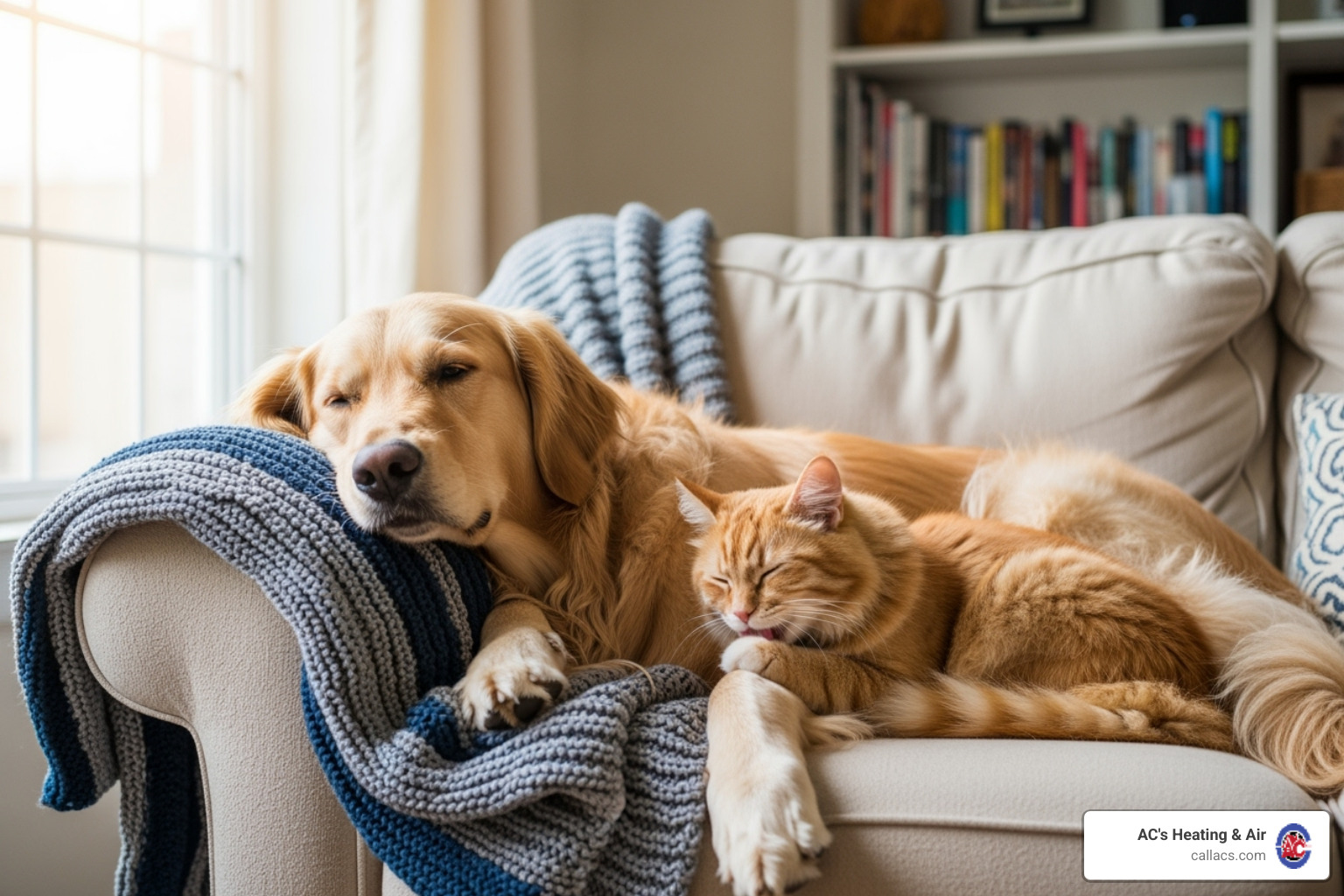
Think of your filter schedule as a recipe needing adjustment for your home's unique ingredients. Let's explore what influences how quickly your filter fills up.
Lifestyle Factors: Adjusting How Often to Replace HVAC Filter
Your daily life significantly impacts your filter. Every person, pet, and activity contributes to what it traps.
Pets are adorable filter-cloggers. They produce a lot of dust and dander. With pets, change your filter every 2 months instead of 3. With multiple pets, check it monthly. During spring and fall shedding seasons, filters can fill with pet hair in just 4-6 weeks.
Allergies and asthma change the game. For households with breathing issues, clean air is essential. I recommend changing filters every 6 weeks for the relief it provides. The EPA provides detailed information about asthma triggers that proper filtration can control. A clogged filter can't catch irritants like pollen and dust mites.
More people means more particles. With multiple occupants, especially kids, there's more activity and dust. Plan on every 2 months for filter changes in busy households. For a vacation home that's often empty, you can stretch filter changes to every 9-12 months since the system runs less.
Indoor smoking clogs filters quickly with tiny, sticky particles. If anyone smokes inside, change your filter much more frequently to protect your system and air quality.
Environmental Factors
Living in Central Florida presents unique challenges that affect how often to replace HVAC filter. Our climate puts extra strain on your system.
Florida's climate is tough on filters. Our HVAC systems work year-round, so filters constantly collect particles. High humidity makes these particles stickier and can lead to mold growth on dirty filters, further restricting airflow.
Construction nearby turns your filter into a dust magnet. All that dust travels into your home. During construction, check your filter monthly. Filters can turn gray with construction dust in weeks, which can overwhelm your filter and strain your system.
Poor outdoor air quality affects your indoor air. Pollutants like urban smog, farm dust, or wildfire smoke make their way inside. When outdoor air quality is poor, your filter works overtime.
The bottom line: Your filter replacement schedule should be unique to your home. Pay attention to these factors to keep your system efficient and your family breathing easy.
Understanding Your Options: Filter Types and MERV Ratings
Choosing the right HVAC filter is about finding the perfect match for your home and system, which directly affects how often to replace HVAC filter. The key is balancing effective air cleaning with proper system airflow. A filter that's too restrictive makes your system overwork; one that's too loose won't clean the air properly.
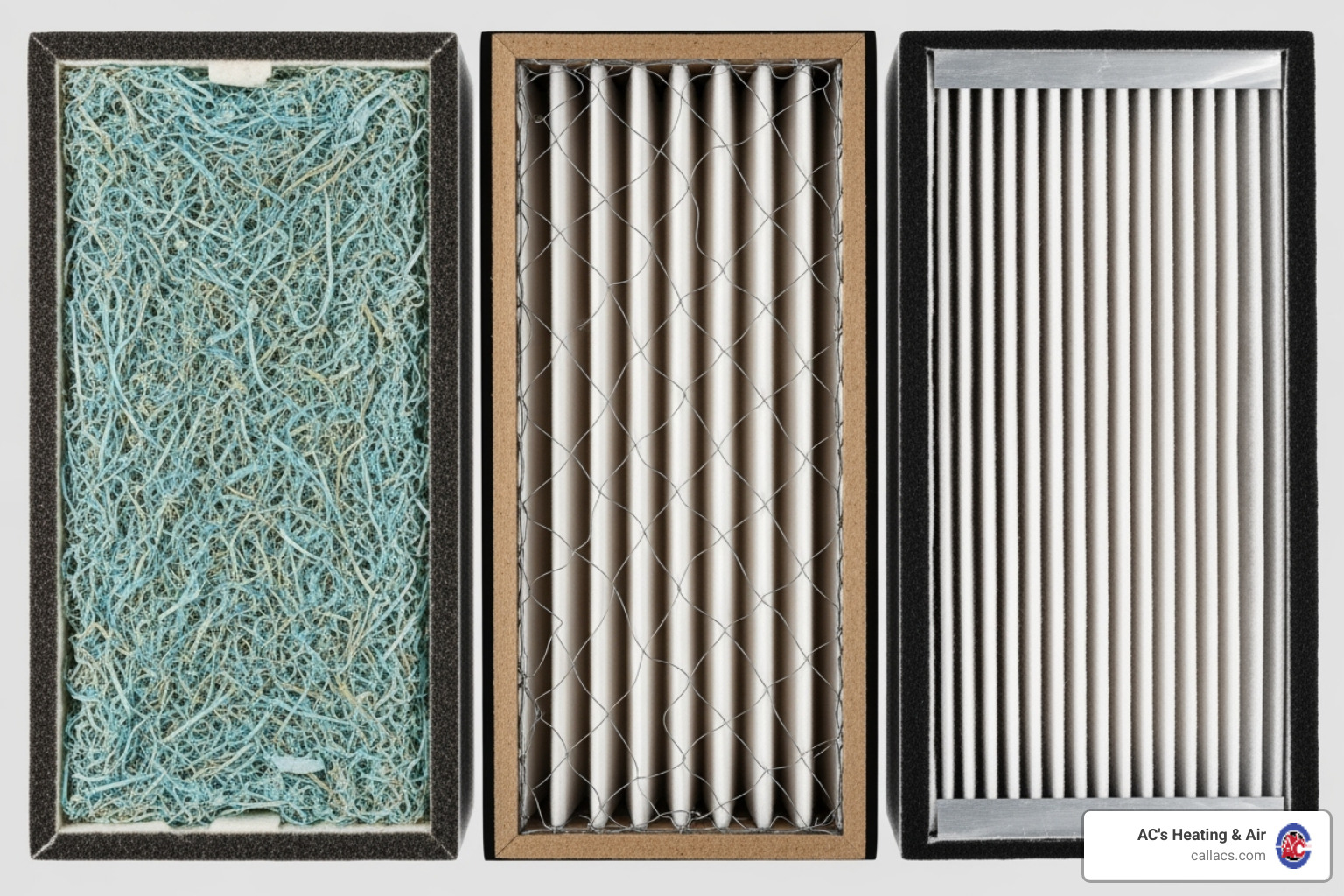
What is a MERV Rating?
MERV stands for Minimum Efficiency Reporting Value. It's a rating from 1 to 20 that tells you how well a filter catches airborne particles. Here's the important part: a higher MERV rating isn't always better for your system. The EPA offers a helpful explanation of MERV ratings.
Using a filter with too high a MERV rating forces your system to work harder, which can strain the fan motor, increase energy bills, and damage your equipment. For most Central Florida homes, MERV 8-13 is the sweet spot. It provides excellent air cleaning without restricting airflow. Always check your owner's manual for the maximum recommended MERV rating.
Filter Types and Their Impact on How Often to Replace HVAC Filter
Fiberglass filters (MERV 1-4) are the budget option. They protect your system from large particles like dust and pet hair but let smaller ones pass through. The trade-off is frequent replacement (every 30-60 days), as they saturate quickly in Florida's environment.
Pleated filters (MERV 5-13) are a popular choice. Their pleated design creates more surface area to trap more particles, so they last longer (60-90 days), offering a great balance of performance and value for most families.
Washable filters seem economical but are complex. They last for years but require dedicated monthly cleaning and may not filter as well as quality disposable ones. If not cleaned and dried perfectly, they can grow mold and bacteria—a real concern in Florida's humidity.
HEPA filters (MERV 17-20) are the gold standard for air cleaning, but they are too dense for most residential HVAC systems. Forcing one into a standard system will overwork the fan motor. They are for specialized systems or standalone purifiers.
Why It Matters: Consequences of a Dirty Filter and How to Spot One
Neglecting your small HVAC filter can create big problems for your wallet and comfort. It's the bodyguard for your system; when it fails, everything suffers.
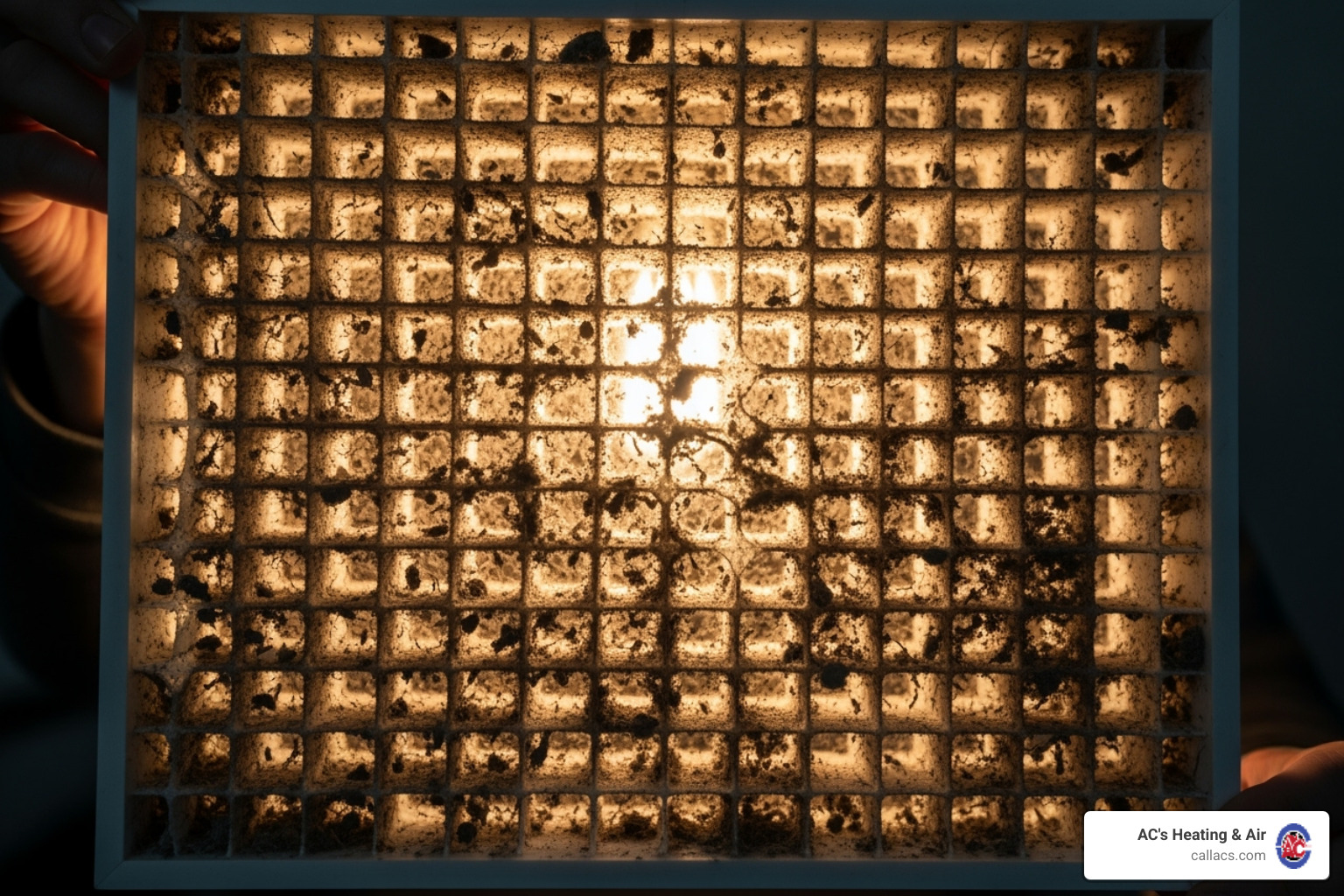
Many homeowners learn this the hard way. A recent customer's clogged filter, a simple $15 fix, led to frozen coils and a much more expensive repair. Knowing how often to replace HVAC filter is about protecting your investment. The filter is your system's first line of defense, catching debris before it damages expensive components like the blower motor or evaporator coils.
The Risks of Neglect
Skipping filter changes makes your system work against itself. The consequences include:
- Increased energy bills: A clogged filter forces the system to work harder, increasing energy use by 5-15%.
- Reduced system efficiency: Your home may feel stuffy, have uneven temperatures, or the system might run constantly without reaching the set temperature.
- HVAC system damage: I've replaced many blower motors that burned out from overworking. These are expensive repairs that leave you without AC.
- Frozen evaporator coils: This is another common, expensive result in Central Florida. Restricted airflow causes coils to ice over, shutting down the AC and risking water damage.
- Poor indoor air quality: Uncaught particles circulate through your home, settling on furniture and potentially triggering allergies or asthma.
Signs Your Filter Needs Changing
The good news: spotting a dirty filter is straightforward.
- Visual inspection: This is key. Pull the filter out. If it's gray, covered in debris, or you can't see light through it, it's time for a replacement. If it looks dirty, it is.
- Reduced airflow from vents: If air feels weaker or rooms are less comfortable, a clogged filter is a likely cause.
- Increased dust around your home: If you're dusting more often, your filter may be failing.
- Musty odors: These can indicate a filter that's been dirty too long, allowing mold to grow in Florida's humidity.
- Higher energy bills: A spike without a clear reason could be due to a dirty filter.
- System runs longer: If your system runs longer than usual, it's likely struggling against a restricted filter.
Your filter works hard to protect your system and comfort. Check and replace it regularly. It's far easier and cheaper than dealing with the alternative.
Frequently Asked Questions about Filter Replacement
Over my years in the HVAC business here in Central Florida, I've heard just about every filter question you can imagine! Here are a few common ones.
What happens if I run my HVAC system without a filter?
This is one of those questions that makes me cringe because I've seen the aftermath. Running an HVAC system without a filter allows dust and debris to build up directly on critical components like the evaporator coil and fan motor, leading to expensive damage and significantly reduced efficiency.
Without a filter, dust, pet hair, and debris go straight into your system's internal components. The damage happens quickly; even a few days can start the buildup, leading to reduced airflow, lower efficiency, and component failure within weeks.
Can I just clean my disposable filter instead of replacing it?
I get this question a lot from homeowners trying to save a few dollars. The short answer is no. Disposable filters are not designed to be cleaned; attempting to vacuum or wash them can damage the filter media, reducing its effectiveness and potentially releasing trapped particles back into your air.
Disposable filters are made from materials like fiberglass or pleated paper that break down when wet or vacuumed, rendering them useless. Only filters explicitly labeled as "washable" or "reusable" should be cleaned. Even then, follow the manufacturer's instructions carefully. Buying a new disposable filter is usually more convenient and effective.
Does a higher MERV rating always mean a better filter?
This is a great question. Not necessarily. While a higher MERV rating means better filtration, it also means more airflow resistance. Using a filter with a MERV rating that is too high for your specific HVAC system can strain the fan motor, reduce efficiency, and even damage the unit.
Think of it like trying to breathe through a thick towel instead of a coffee filter. Your HVAC system faces the same struggle with overly restrictive filters. Always check your system's manual for the maximum recommended MERV rating. Most residential systems in Central Florida work best with a MERV 8-11 rating. I've seen many systems damaged by MERV 13+ filters, resulting in frozen coils and overworked motors. When in doubt about how often to replace HVAC filter or which MERV rating to use, consult a professional.
Keep Your System Healthy and Your Air Clean
Now you know how often to replace HVAC filter to keep your Central Florida home comfortable and your family breathing clean air. It's amazing how this simple component has such a huge impact.
Your HVAC filter is the unsung hero of your home, protecting equipment, controlling energy bills, and cleaning your air. Whether dealing with Florida's year-round humidity, pet dander, or allergies, regular filter changes are a smart investment.
There's no single answer to how often to replace HVAC filter. A 1-inch pleated filter with pets might need changing every two months, while a 5-inch media filter could last a year. The key is to understand your home's needs and adjust.
Proactive maintenance means paying attention to your system. Reduced airflow, more dust, or higher energy bills are signs your filter needs checking. A quick visual check can save you hundreds in repairs.
At AC's Heating & Air, we've seen consistent filter changes prevent major breakdowns. Our team helps families in Apopka, Winter Park, Orlando, and Winter Garden keep their systems running smoothly. In Florida's demanding climate, prevention is key.
If you're unsure about your filter or still have issues despite regular changes, don't hesitate to reach out. Sometimes what seems like a filter problem might indicate it's time for a system upgrade.
Learn more about our HVAC Replacement services and let us help you breathe easier while keeping your home perfectly comfortable year-round!

